作文评点升格 不忘传统,不避交融--中国人该不该过洋节任务驱动作文升格指导
中国人应不应该过洋节英语作文
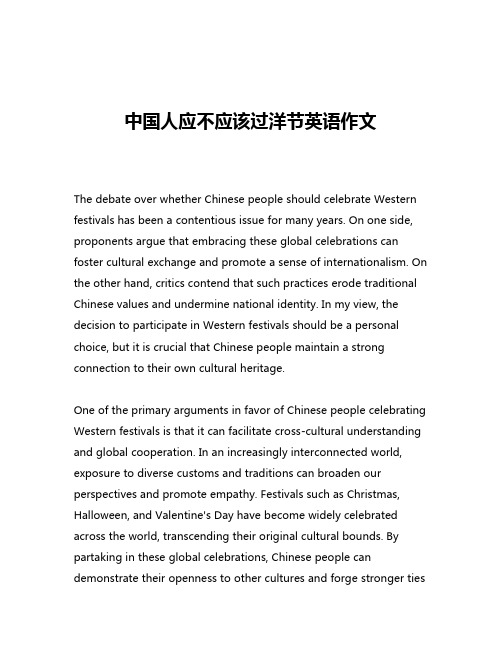
中国人应不应该过洋节英语作文The debate over whether Chinese people should celebrate Western festivals has been a contentious issue for many years. On one side, proponents argue that embracing these global celebrations can foster cultural exchange and promote a sense of internationalism. On the other hand, critics contend that such practices erode traditional Chinese values and undermine national identity. In my view, the decision to participate in Western festivals should be a personal choice, but it is crucial that Chinese people maintain a strong connection to their own cultural heritage.One of the primary arguments in favor of Chinese people celebrating Western festivals is that it can facilitate cross-cultural understanding and global cooperation. In an increasingly interconnected world, exposure to diverse customs and traditions can broaden our perspectives and promote empathy. Festivals such as Christmas, Halloween, and Valentine's Day have become widely celebrated across the world, transcending their original cultural bounds. By partaking in these global celebrations, Chinese people can demonstrate their openness to other cultures and forge stronger tieswith the international community.Moreover, the adoption of Western festivals can be viewed as a natural consequence of globalization and the exchange of ideas. As China has become more integrated into the global economy and political landscape, its citizens have been increasingly exposed to foreign influences. The embrace of these Western traditions can be seen as a reflection of China's growing cosmopolitan outlook and its desire to participate in the global cultural discourse. By selectively incorporating elements of Western festivals into their own celebrations, Chinese people can demonstrate their ability to adapt and evolve while still preserving their core cultural identity.However, critics of this practice argue that the celebration of Western festivals by Chinese people undermines traditional Chinese values and erodes national identity. They contend that the uncritical adoption of these foreign customs can lead to the displacement of cherished Chinese traditions and the dilution of cultural authenticity. For instance, the commercialization and widespread celebration of Christmas in China has been criticized for overshadowing the significance of the Lunar New Year, a deeply rooted and culturally significant event in the Chinese calendar.Furthermore, opponents argue that the celebration of Western festivals can be perceived as a form of cultural imperialism, wherethe dominant Western cultures exert their influence and displace local traditions. They contend that by embracing these foreign celebrations, Chinese people are inadvertently contributing to the homogenization of global culture and the marginalization of their own cultural heritage. This concern is particularly salient in a country like China, which has a rich and diverse cultural legacy that has endured for thousands of years.In my view, the decision to participate in Western festivals should be a personal choice, but it is crucial that Chinese people maintain a strong connection to their own cultural heritage. While embracing elements of global culture can be beneficial in fostering cross-cultural understanding and adaptability, it should not come at the expense of neglecting or devaluing traditional Chinese practices.One possible compromise could be the selective and mindful incorporation of Western festival elements into existing Chinese celebrations. For instance, Chinese people could incorporate the gift-giving traditions of Christmas into the Lunar New Year festivities, or blend the spirit of Halloween with the Qingming Festival, which honors ancestors. In this way, Chinese people can engage with global cultural trends while still preserving the core essence of their own traditions.Additionally, it is essential that Chinese educational institutions andmedia outlets prioritize the teaching and promotion of traditional Chinese culture. By ensuring that future generations are well-versed in their cultural heritage, they can develop a strong sense of identity and pride, which can serve as a foundation for their engagement with global cultures.In conclusion, the debate over whether Chinese people should celebrate Western festivals is a complex issue that involves considerations of cultural exchange, national identity, and personal choice. While the embrace of global cultural trends can be beneficial, it is crucial that Chinese people maintain a strong connection to their own rich and diverse cultural legacy. By striking a balance between the adoption of Western festival elements and the preservation of traditional Chinese practices, Chinese people can navigate the challenges of globalization while remaining true to their cultural roots.。
传统节日与洋节议论文作文
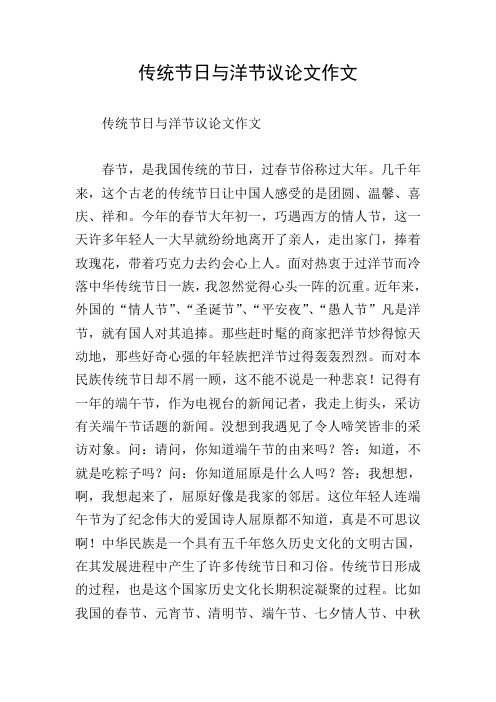
传统节日与洋节议论文作文传统节日与洋节议论文作文春节,是我国传统的节日,过春节俗称过大年。
几千年来,这个古老的传统节日让中国人感受的是团圆、温馨、喜庆、祥和。
今年的春节大年初一,巧遇西方的情人节,这一天许多年轻人一大早就纷纷地离开了亲人,走出家门,捧着玫瑰花,带着巧克力去约会心上人。
面对热衷于过洋节而冷落中华传统节日一族,我忽然觉得心头一阵的沉重。
近年来,外国的“情人节”、“圣诞节”、“平安夜”、“愚人节”凡是洋节,就有国人对其追捧。
那些赶时髦的商家把洋节炒得惊天动地,那些好奇心强的年轻族把洋节过得轰轰烈烈。
而对本民族传统节日却不屑一顾,这不能不说是一种悲哀!记得有一年的端午节,作为电视台的新闻记者,我走上街头,采访有关端午节话题的新闻。
没想到我遇见了令人啼笑皆非的采访对象。
问:请问,你知道端午节的由来吗?答:知道,不就是吃粽子吗?问:你知道屈原是什么人吗?答:我想想,啊,我想起来了,屈原好像是我家的邻居。
这位年轻人连端午节为了纪念伟大的爱国诗人屈原都不知道,真是不可思议啊!中华民族是一个具有五千年悠久历史文化的文明古国,在其发展进程中产生了许多传统节日和习俗。
传统节日形成的过程,也是这个国家历史文化长期积淀凝聚的过程。
比如我国的春节、元宵节、清明节、端午节、七夕情人节、中秋节等都是中华民族古老的传统节日,可以说每一个传统节日都凝结着深厚的民族情结,承载着动人的历史故事,寄托着华夏儿女的希望和祈福。
我们应该珍惜和传承。
可是,随着时间的推移,国门的打开,传统的节日渐渐淡化了,传统的记忆渐渐的褪色了,不仅如此,崇洋媚外现象不胜枚举。
不是吗?好端端的一头黑发漂染成黄头发,认为是时尚;穿上袒胸露背的服装被视为洋气;中国的七夕情人节无人问津,西方情人节却津津乐道。
当然,对于西方文化的精华我们是可以吸取的,不过,应该是在发扬、继承中国传统文化的前提下。
当春节的亲情和洋节的爱情发生冲突时,别忘了我们是中国人。
高考语文满分作文范例及解析--过洋节不等于遗忘传统

阅读下面的材料,根据要求写作。
近日某中学举行了一场以“中国人该不该过洋节”为主题的辩论赛。
辩论正方的观点是:中国人不应该过洋节,这是崇洋媚外的表现,会致使本土文化逐渐流失。
辩论反方的观点是:中国人应该过洋节,对于世界文化,我们都主张多元并存,兼收并蓄。
倘若因为担心洋节的兴起会使我国的传统遭到破坏,而选择去抵制,这不是一种爱护行为,而是对自己的文化极度不自信的行为。
面对西方文化的冲击,你觉得应该采取何种态度呢?请你在正反双方中选择一方作为自己的立场写一篇辩论稿。
要求:选好角度,确定立意,明确文体,自拟标题:不要套作,不得抄袭。
不少于800字。
【试题来源】广东省珠海市2020届高三9月摸底考试语文试题【答案解析】过洋节不等于遗忘传统近年来,圣诞节、情人节、万圣节、感恩节等一个个洋节来势凶猛,大有反超中国传统节日、喧宾夺主之势,无怪乎有人要惊呼“抵制外来文化侵”,无怪乎有学校要封校禁止过洋节然而,洋节真的能冲击我们的传统节日吗?这么想未免太缺乏文化自信了。
承载着五千年传统文化的传统节日,表达着人们对生活的美好祈盼,千百年来,何曾间断?洋节对中国传统节日观念的影响,更多地体现在消费行为上面。
其实,各种各样的洋节在中国的火爆,正是得益于很多商家把洋节包装得无比热闹,助推了洋节在中国的流行。
中国年轻人过的圣诞节,是舶来品,没有虔诚的宗教信仰,只有热销的平安果;没有安详和宁静,只有喧闹和沸腾,又何谈文化冲击?过洋节并不一定代表着对中国传统节日的冷落,这只是说明了年轻人对新事物的一种好奇。
就像你觉得苹果好吃,但有一天你发现橘子更好吃,但你并不一定会因为橘子好吃而不爱吃苹果。
黄佳明在《传统节日文化的现代困境及其出路》中说:“圣诞节的温馨、愚人节的娱乐、情人节的浪漫、万圣节的疯狂,都因给不重视传统文化而变得平淡的年轻人的生活,增添轻松愉快的时刻而备受青睐。
”也正是如此,年轻人过洋节的原因很简单,不是因为文化信仰,而是因为轻松愉快。
作文题解:中国人该不该过洋节
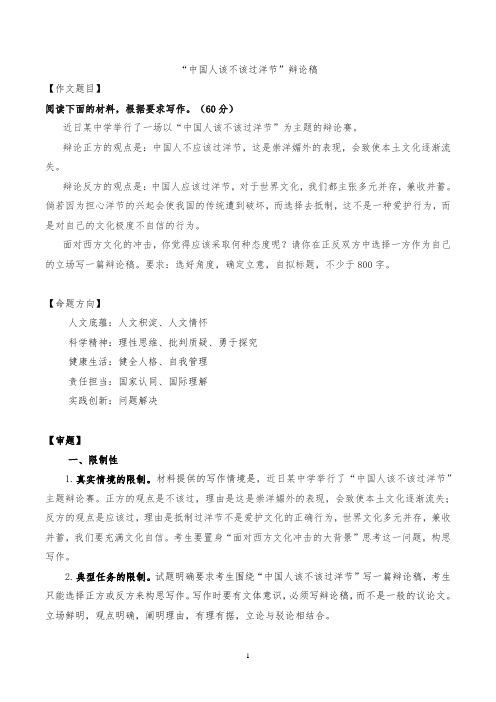
“中国人该不该过洋节”辩论稿【作文题目】阅读下面的材料,根据要求写作。
(60分)近日某中学举行了一场以“中国人该不该过洋节”为主题的辩论赛。
辩论正方的观点是:中国人不应该过洋节,这是崇洋媚外的表现,会致使本土文化逐渐流失。
辩论反方的观点是:中国人应该过洋节,对于世界文化,我们都主张多元并存,兼收并蓄。
倘若因为担心洋节的兴起会使我国的传统遭到破坏,而选择去抵制,这不是一种爱护行为,而是对自己的文化极度不自信的行为。
面对西方文化的冲击,你觉得应该采取何种态度呢?请你在正反双方中选择一方作为自己的立场写一篇辩论稿。
要求:选好角度,确定立意,自拟标题,不少于800字。
【命题方向】人文底蕴:人文积淀、人文情怀科学精神:理性思维、批判质疑、勇于探究健康生活:健全人格、自我管理责任担当:国家认同、国际理解实践创新:问题解决【审题】一、限制性1.真实情境的限制。
材料提供的写作情境是,近日某中学举行了“中国人该不该过洋节”主题辩论赛。
正方的观点是不该过,理由是这是崇洋媚外的表现,会致使本土文化逐渐流失;反方的观点是应该过,理由是抵制过洋节不是爱护文化的正确行为,世界文化多元并存,兼收并蓄,我们要充满文化自信。
考生要置身“面对西方文化冲击的大背景”思考这一问题,构思写作。
2.典型任务的限制。
试题明确要求考生围绕“中国人该不该过洋节”写一篇辩论稿,考生只能选择正方或反方来构思写作。
写作时要有文体意识,必须写辩论稿,而不是一般的议论文。
立场鲜明,观点明确,阐明理由,有理有据,立论与驳论相结合。
3.价值判断的限制。
材料中隐含的价值取向是开放的,考生可以从防止本土文化流失的角度选择正方,也可以从主张文化要多元并存、兼收并蓄的角度选择反方,但不可骑墙折中,和稀泥。
二、开放性1.立意角度是开放的。
考生可以选择正方,认为中国人不应过洋节;也可以选择反方,主张中国人应该过洋节。
只要观点有据,言之成理,能自圆其说即可,立意具有一定的开放性。
中国人该不该过洋节

中国人该不该过洋节?有的人认为应该过,过洋节无可厚非;而有的人又觉得不该过,认为过洋节忘本;而当我第一次触到这个问题时,我就觉得没有什么该不该的,凭个人喜好,想过洋节的人就过吧,对洋节没意思的人不过也不要勉强自己啦。
忠于本心,才能享受人生嘛。
一直以来文化的精髓,或者说它发展的生命力,在于这个文化的包容性和开放性。
中国文化是一个开放的文化系统,也正因其开放,才更具有强大的生命力。
盲目地排斥外来文化,是一种文化上的不自信。
不自信的文化形态,往往是没有生命力的。
世界文明的发展,全球化的加速交流决定了各民族文化的融合,而不是互相抵制和歧视。
文化发展的过程是一个扬长弃短的过程,一些洋节有引人向善的精神,同中国的道德体系有一致性,也是对中国传统道德的补充与完善。
吸取其精华,去其糟粕,对现时中国社会文化建设将大有裨益。
洋节,给中国带来了人类的另一种文明,它的浪漫诗意和温馨人情,给世人增添了更多的喜气。
特别是父亲节、母亲节和感恩节,与我国本土传统文化精神和民族道德情感不仅毫无冲突,反而特别吻合。
我们为什么要讨论该不该过呢?我觉得多个节日,即使是洋节,给商人多一个赚钱的机会,给自己多一个放松的理由,给与朋友多一个喝酒的借口,给与家人多在一起温馨的感觉,总会是不错的选择。
总的来说真的谈不上“该不该”,现在也有很多老外喜欢过春节看耍狮吃饺子,中秋赏月吃月饼,端午节与我们一起看龙船比赛,所以有些令人喜爱的洋节我们为什么还要去讨论该不该过呢?当然了,我们的传统文化也应该与时俱进,增加或者说强化一些精神娱乐的因素,迎合大众,增强民族节日的自豪感。
的确,过洋节给我们的民族文化安全带来威胁,如果若干年后的中国人只知道洋节,而忘了自己的传统,还需要到美国的唐人街去学习过春节过中秋就贻笑皆非了。
这点本土为主,外来为辅的原则可不能改变哦。
其实,过什么节,是什么节日名字无所谓,大家只是图个欢乐、放松的机会。
不管怎么看待洋节,大家都能找到令自己高兴开心的事由就好!这才是最重要的!。
中国人是否应该过洋节英语作文

中国人是否应该过洋节英语作文China is a country with a rich and diverse cultural heritage, and the Chinese people have long-standing traditions and customs that have been passed down through generations. In recent years, the celebration of Western festivals, such as Christmas and Valentine's Day, has become increasingly popular among the Chinese people. This trend has sparked a debate among scholars and the general public about whether Chinese people should continue to observe these foreign festivals or focus more on traditional Chinese celebrations.One argument in favor of Chinese people celebrating Western festivals is that it can help to foster greater cultural exchange and understanding between China and other countries around the world. By participating in these celebrations, Chinese people can learn more about the customs and traditions of other cultures, which can lead to a greater appreciation for diversity and a more globalized worldview. Additionally, the celebration of Western festivals can provide opportunities for Chinese people to engage in social activities and strengthen interpersonal relationships, which can be beneficial for their overall well-being.Moreover, some proponents of Western festival celebrations argue that they can serve as a way for Chinese people to take a break from the rigors of everyday life and engage in leisure activities that can help to relieve stress and promote a sense of relaxation and enjoyment. In a society that is often characterized by a strong emphasis on academic and professional achievement, the celebration of Western festivals can provide a much-needed respite from the demands of work and study.However, there are also those who argue that Chinese people should focus more on traditional Chinese celebrations and festivals, as these events are an integral part of the country's cultural identity and heritage. They contend that the celebration of Western festivals can lead to a dilution of Chinese culture and a loss of traditional values and beliefs. Additionally, some critics argue that the commercialization and commodification of these Western festivals can have negative impacts on Chinese society, such as the promotion of materialism and consumerism.Another argument against the celebration of Western festivals in China is that they may not align with the values and beliefs of the Chinese people. For example, the celebration of Christmas, which is a Christian holiday, may not resonate with the predominantly non-Christian population of China. Similarly, the celebration of Valentine's Day, which is often associated with romantic love and the exchangeof gifts, may not be in line with traditional Chinese values that emphasize filial piety and the importance of family.Ultimately, the debate over whether Chinese people should continue to celebrate Western festivals or focus more on traditional Chinese celebrations is a complex and multifaceted issue. While there are valid arguments on both sides, it is important to acknowledge that the decision should be made based on a careful consideration of the cultural, social, and economic implications of these practices.One potential solution to this dilemma could be to find a balance between the celebration of Western festivals and traditional Chinese celebrations. This could involve incorporating elements of Western festivals into existing Chinese celebrations, or creating new hybrid celebrations that draw on the traditions of both cultures. By adopting a more inclusive and nuanced approach, Chinese people can continue to engage with the global community while also preserving their cultural heritage and identity.In conclusion, the debate over whether Chinese people should over Western festivals is a complex and multifaceted issue that requires careful consideration of the cultural, social, and economic implications of these practices. While there are valid arguments on both sides, it is important to find a balance that allows for cultural exchange and the preservation of traditional values and beliefs.Ultimately, the decision should be made based on a holistic understanding of the needs and aspirations of the Chinese people.。
中国人是否该过洋节英语作文

中国人是否该过洋节英语作文China is a country with a rich cultural heritage, and its people have long celebrated their own traditional festivals and holidays. However, in recent years, there has been a growing trend among the Chinese people to embrace and celebrate Western holidays, such as Christmas and Valentine's Day. This has led to a debate about whether Chinese people should continue to observe these "foreign" celebrations or focus more on their own cultural traditions.One of the main arguments in favor of celebrating Western holidays is that it can help to broaden the cultural horizons of the Chinese people. By engaging with different cultural traditions, they can gain a deeper understanding and appreciation of the world around them. Additionally, many Chinese people, especially the younger generation, find these Western holidays to be exciting and fun, providing them with an opportunity to explore new customs and traditions.Furthermore, some argue that celebrating Western holidays can also have economic benefits for China. The increased demand for goods and services associated with these holidays can drive economic growth and create new business opportunities. For example, theChristmas holiday has become a major shopping season in China, with consumers spending billions of dollars on gifts, decorations, and other holiday-related items.However, those who oppose the celebration of Western holidays argue that it can lead to a loss of Chinese cultural identity. They believe that the Chinese people should focus more on preserving and promoting their own traditional festivals and customs, which are an integral part of their national heritage. These festivals, such as the Lunar New Year and the Mid-Autumn Festival, have deep historical and cultural significance, and many Chinese people feel a strong emotional connection to them.Moreover, some critics argue that the celebration of Western holidays can also have negative social and environmental consequences. For example, the tradition of giving gifts during Christmas has led to an increase in consumerism and waste, as people feel compelled to buy more and more gifts to keep up with the expectations of the holiday. This can have a detrimental impact on the environment and contribute to the growing problem of overconsumption.In conclusion, the debate over whether Chinese people should continue to celebrate Western holidays or focus more on their own cultural traditions is a complex and multifaceted issue. While thereare valid arguments on both sides, it is ultimately up to the Chinese people to decide how they want to approach this issue. What is clear, however, is that preserving and celebrating one's cultural heritage is an important aspect of personal and national identity, and it is crucial that the Chinese people find a way to balance their traditional customs with the desire to engage with the wider world.。
英语作文题目中国人该不该过洋节

英语作文题目中国人该不该过洋节In today's globalized world, many foreign festivals have also gradually entered China. Some people believe that we should maintain our traditional festivals and should not celebrate those foreign festivals. But some people also believe that it is not bad to properly celebrate some foreign festivals.Those who oppose it believe that we should attach importance to our own traditional culture and should not be assimilated by foreign cultures. China has a rich festival culture, such as Spring Festival and Mid-Autumn Festival, which are imbued with deep historical and cultural connotations. We should cherish and inherit these festivals, and pass on the Chinese culture.Those who support celebrating foreign festivals believe that it is not bad to participate in some foreign festivals appropriately. This can help us understand different countries and cultures, and promote cultural exchange. For example, celebrating Christmas can allow children to experience the festive atmosphere and cultivate their international perspective.In general, there is no standard answer to this question. We need to protect our traditional culture while also integrating with the world, which requires us to find a balance between the two. The key is to respect different cultural traditions and promote cultural exchange and integration.在全球化的今天,许多外来节日也逐渐传入中国。
弘扬传统文化拒绝过洋节作文
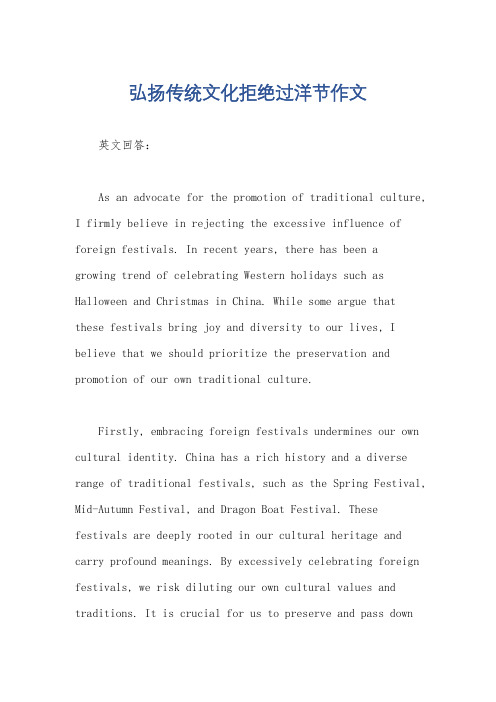
弘扬传统文化拒绝过洋节作文英文回答:As an advocate for the promotion of traditional culture, I firmly believe in rejecting the excessive influence of foreign festivals. In recent years, there has been agrowing trend of celebrating Western holidays such as Halloween and Christmas in China. While some argue that these festivals bring joy and diversity to our lives, I believe that we should prioritize the preservation and promotion of our own traditional culture.Firstly, embracing foreign festivals undermines our own cultural identity. China has a rich history and a diverse range of traditional festivals, such as the Spring Festival, Mid-Autumn Festival, and Dragon Boat Festival. Thesefestivals are deeply rooted in our cultural heritage and carry profound meanings. By excessively celebrating foreign festivals, we risk diluting our own cultural values and traditions. It is crucial for us to preserve and pass downour own cultural heritage to future generations.Furthermore, promoting traditional culture can foster a sense of national pride and unity. Traditional festivals provide an opportunity for people to come together and celebrate shared values and customs. For example, during the Spring Festival, families gather for reunion dinners, exchange red envelopes, and set off fireworks. These traditions not only strengthen family bonds but also create a sense of belonging to a larger community. By rejecting foreign festivals and focusing on our own traditions, we can strengthen our national identity and promote social cohesion.Moreover, embracing foreign festivals can have negative economic and environmental impacts. The commercialization of foreign festivals often leads to excessive consumption and wasteful spending. For instance, during Christmas, people buy and exchange gifts, decorate their homes with lights, and indulge in extravagant feasts. This consumerist culture not only puts a strain on individuals' finances but also contributes to environmental degradation. By promotingtraditional festivals, which are often more focused on community and spiritual values rather than materialism, we can encourage sustainable and responsible consumption.In conclusion, it is essential for us to reject the excessive influence of foreign festivals and instead focus on promoting our own traditional culture. By doing so, we can preserve our cultural identity, foster national pride and unity, and promote sustainable and responsible consumption. Let us embrace our own traditional festivals and pass down the richness of our cultural heritage tofuture generations.中文回答:作为传统文化的倡导者,我坚决主张拒绝过度的外来节日的影响。
中国人是否应该过洋节英语作文

Should Chinese People Celebrate WesternHolidays?In the context of globalization and cultural exchange, the question of whether Chinese people should celebrate Western holidays has become increasingly pertinent. This debate often centers around the preservation of traditional values versus the embrace of foreign cultures, reflecting a complex interplay between national identity, cultural heritage, and modern influences.On one side of the argument, many believe that Chinese people should prioritize their own traditional holidays and festivals. These holidays, such as the Spring Festival, Dragon Boat Festival, and Mid-Autumn Festival, are deeply rooted in Chinese history and culture, carrying rich meanings and values that are integral to the nation's identity. Celebrating these holidays is not only a way to commemorate historical events and heroes, but also a means of passing down cultural traditions and fostering a sense of belonging and unity among the Chinese people.Furthermore, traditional Chinese holidays often involve family reunions, feasting, and other forms of collectivecelebration, promoting strong social bonds and a sense of community. These aspects of Chinese culture are unique and cannot be replicated by Western holidays, which tend to focus more on individualistic pursuits like gift-giving and consumerism.However, the other side of the argument maintains that Chinese people should not be averse to celebrating Western holidays. In today's interconnected world, cultural exchange and diversity are essential for promoting mutual understanding and respect between different cultures. Western holidays, such as Christmas, Valentine's Day, and Thanksgiving, offer Chinese people an opportunity to learn about and appreciate Western cultures, traditions, and values.Moreover, these holidays provide a platform for socializing and having fun, often bringing people together from different backgrounds to share joy and celebration. While these holidays may not carry the same historical and cultural significance as traditional Chinese holidays, they can still be enjoyed as a way to broaden cultural horizons and enrich personal experiences.Of course, it is important to strike a balance between celebrating Western holidays and preserving Chinese traditions. This can be achieved by integrating elements of both cultures into celebrations, or by alternating between celebrating Western and Chinese holidays. For instance, families could choose to celebrate Christmas with a traditional Western meal followed by a Chinese-style fireworks display, or they could combine Valentine's Day with traditional Chinese expressions of love and affection. In conclusion, the question of whether Chinese people should celebrate Western holidays is not a straightforward one. While preserving and promoting traditional Chinese holidays is undoubtedly important for maintaining cultural identity and heritage, embracing Western holidays can also be beneficial in terms of cultural exchange, mutual understanding, and personal enrichment. The key is to find a balance that respects and honors both cultures while allowing individuals to enjoy and celebrate in a way thatis meaningful and enjoyable to them.**中国人是否应该过洋节**在全球化和文化交流的大背景下,中国人是否应该庆祝西方节日的问题日益凸显。
中国人该不该过洋节英语作文建议

中国人该不该过洋节英语作文建议Should Chinese People Celebrate Western Holidays?In recent years, there has been an increasing trend in China of celebrating Western holidays such as Christmas, Halloween, and Valentine's Day. Some people argue that embracing these holidays can help promote cultural exchange and understanding between China and the West. However, others believe that Chinese people should focus on their own traditional festivals and not adopt foreign holidays. So, the question arises: Should Chinese people celebrate Western holidays?Those in favor of celebrating Western holidays argue that it can be a way to learn about different cultures and traditions. By participating in these celebrations, Chinese people can gain a better understanding of Western customs and values. It can also create opportunities for people from different backgrounds to come together and celebrate together, fostering a sense of unity and inclusivity.Moreover, celebrating Western holidays can also be a way to boost the economy. Many businesses in China have taken advantage of the popularity of Western holidays to sell products and services. For example, during Christmas season, many shopsand restaurants offer special promotions and decorations to attract customers. This can stimulate consumer spending and drive economic growth.On the other hand, opponents argue that Chinese people should prioritize their own traditional festivals and customs. They believe that by focusing on Western holidays, Chinese people are neglecting their own cultural heritage. China has a rich history of festivals such as the Spring Festival, Mid-Autumn Festival, and Dragon Boat Festival, which are deeply ingrained in Chinese culture and should be preserved and cherished.Additionally, some people argue that the commercialization of Western holidays in China has led to the loss of their original meaning and significance. For example, Valentine's Day has become more about buying gifts and flowers rather than expressing love and affection. This commercialization can distract people from the true spirit and values of these holidays.In conclusion, whether Chinese people should celebrate Western holidays is a complex issue with valid arguments on both sides. While embracing Western holidays can promote cultural exchange and unity, it is also important to preserve Chinese traditions and values. Ultimately, it is up to the individual to decide how they want to celebrate holidays and what culturalpractices they want to adopt. As long as the celebration is respectful and meaningful, there is no right or wrong answer. Let us celebrate the diversity of traditions and customs that make our world a rich and vibrant place.。
该不该过洋节作文
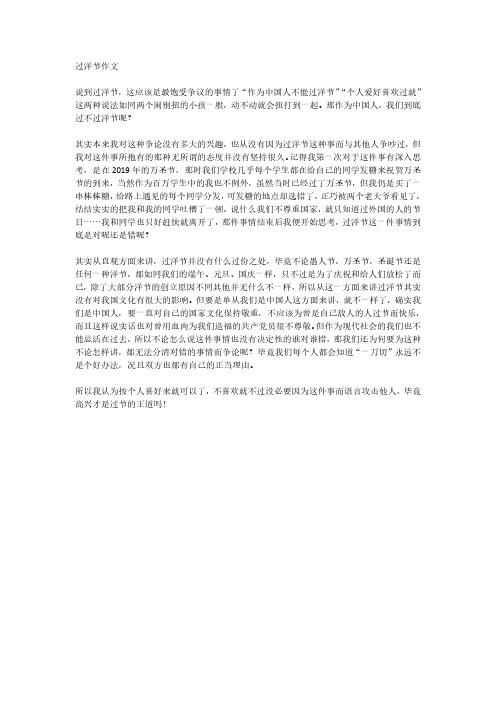
过洋节作文说到过洋节,这应该是最饱受争议的事情了“作为中国人不能过洋节”“个人爱好喜欢过就”这两种说法如同两个闹别扭的小孩一般,动不动就会扭打到一起。
那作为中国人,我们到底过不过洋节呢?其实本来我对这种争论没有多大的兴趣,也从没有因为过洋节这种事而与其他人争吵过,但我对这件事所抱有的那种无所谓的态度并没有坚持很久。
记得我第一次对于这件事有深入思考,是在2019年的万圣节,那时我们学校几乎每个学生都在给自己的同学发糖来祝贺万圣节的到来,当然作为百万学生中的我也不例外,虽然当时已经过了万圣节,但我仍是买了一串棒棒糖,给路上遇见的每个同学分发,可发糖的地点却选错了,正巧被两个老大爷看见了,结结实实的把我和我的同学吐槽了一顿,说什么我们不尊重国家,就只知道过外国的人的节日……我和同学也只好赶快就离开了,那件事情结束后我便开始思考,过洋节这一件事情到底是对呢还是错呢?其实从直观方面来讲,过洋节并没有什么过份之处,毕竟不论愚人节,万圣节,圣诞节还是任何一种洋节,都如同我们的端午、元旦、国庆一样,只不过是为了庆祝和给人们放松了而已,除了大部分洋节的创立原因不同其他并无什么不一样,所以从这一方面来讲过洋节其实没有对我国文化有很大的影响。
但要是单从我们是中国人这方面来讲,就不一样了,确实我们是中国人,要一直对自己的国家文化保持敬重,不应该为曾是自己敌人的人过节而快乐,而且这样说实话也对曾用血肉为我们造福的共产党员很不尊敬。
但作为现代社会的我们也不能总活在过去,所以不论怎么说这件事情也没有决定性的谁对谁错,那我们还为何要为这种不论怎样讲,都无法分清对错的事情而争论呢?毕竟我们每个人都会知道“一刀切”永远不是个好办法,况且双方也都有自己的正当理由。
所以我认为按个人喜好来就可以了,不喜欢就不过没必要因为这件事而语言攻击他人,毕竟高兴才是过节的王道吗!。
作文评点升格 不忘传统,不避交融 -----中国人该不该过洋节任务驱动作文升格指导
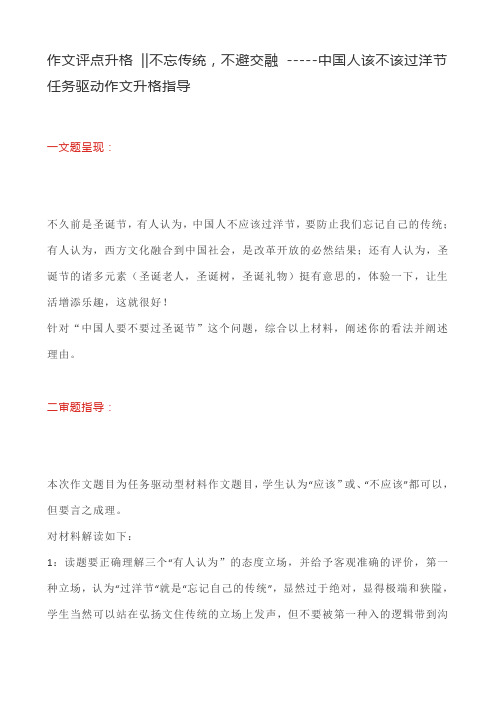
作文评点升格||不忘传统,不避交融-----中国人该不该过洋节任务驱动作文升格指导一文题呈现:不久前是圣诞节,有人认为,中国人不应该过洋节,要防止我们忘记自己的传统;有人认为,西方文化融合到中国社会,是改革开放的必然结果;还有人认为,圣诞节的诸多元素(圣诞老人,圣诞树,圣诞礼物)挺有意思的,体验一下,让生活增添乐趣,这就很好!针对“中国人要不要过圣诞节”这个问题,综合以上材料,阐述你的看法并阐述理由。
二审题指导:本次作文题目为任务驱动型材料作文题目,学生认为“应该”或、“不应该”都可以,但要言之成理。
对材料解读如下:1:读题要正确理解三个“有人认为”的态度立场,并给予客观准确的评价,第一种立场,认为“过洋节“就是“忘记自己的传统”,显然过于绝对,显得极端和狭隘,学生当然可以站在弘扬文住传统的立场上发声,但不要被第一种入的逻辑带到沟里。
写“洋节”的火爆引发我们重视传统节日,完全可以;但认为“过洋节”就是数典忘祖,自然是武断和“戴帽子”的强调,应该视作分析不客观;2:抓住第二个“有人认为”,主张已开放的心态接受文化的交融,以包容的立场看待“中国人过洋节”,视作切题恰当;3:以“传统节日”与“洋节”比照,谈“洋节”之所以吸引年轻人是因为它不像中国传统节日习俗有那么多繁文缛节,不承载太多的的道德内容;因此让传统节日如何火起来是一个值得思考的问题。
.4:中国需要多元的文化形态,“过洋节正好满足了这种时代需求和大众宙姜需要。
5:扣住材料第三个“有人认为”,谈过节的方式或对“过节”价值意义的理解亦可,如认为过节可以是表层面的热闹、愉悦、增添乐趣,也可以把“过节”看作挖掘文化意义,传承文化血脉的特殊形式,都应该被肯定。
(也有人由表及呈说亦可)本次作文如泛谈“包容” “沟通”“革新”而完全不涉及“节日”,应视作不切题意;如只是简单比较圣诞节和中国节日的内容意义,而并不涉及人的立场、态度,也应视作偏题;如写成“生活的乐趣”、“懂得体验”视作偏题,如泛谈“做一个爱国者”、“思念故土”、“叶落归根”等应视作偏题。
反对洋节,弘扬中国传小作文
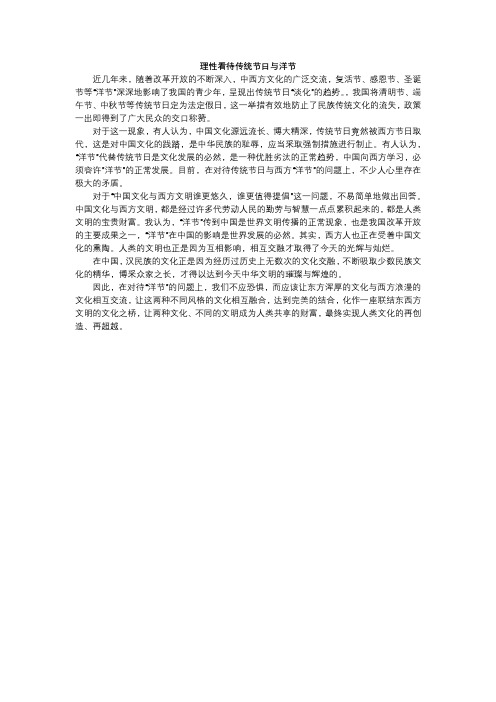
理性看待传统节日与洋节
近几年来,随着改革开放的不断深入,中西方文化的广泛交流,复活节、感恩节、圣诞节等“洋节”深深地影响了我国的青少年,呈现出传统节日“淡化”的趋势。
,我国将清明节、端午节、中秋节等传统节日定为法定假日,这一举措有效地防止了民族传统文化的流失,政策一出即得到了广大民众的交口称赞。
对于这一现象,有人认为,中国文化源远流长、博大精深,传统节日竟然被西方节日取代,这是对中国文化的践踏,是中华民族的耻辱,应当采取强制措施进行制止。
有人认为,“洋节”代替传统节日是文化发展的必然,是一种优胜劣汰的正常趋势,中国向西方学习,必须容许"洋节”的正常发展。
目前,在对待传统节日与西方“洋节”的问题上,不少人心里存在极大的矛盾。
对于“中国文化与西方文明谁更悠久,谁更值得提倡”这一问题,不易简单地做出回答。
中国文化与西方文明,都是经过许多代劳动人民的勤劳与智慧一点点累积起来的,都是人类文明的宝贵财富。
我认为,“洋节”传到中国是世界文明传播的正常现象,也是我国改革开放的主要成果之一,“洋节”在中国的影响是世界发展的必然。
其实,西方人也正在受着中国文化的熏陶。
人类的文明也正是因为互相影响,相互交融才取得了今天的光辉与灿烂。
在中国,汉民族的文化正是因为经历过历史上无数次的文化交融,不断吸取少数民族文化的精华,博采众家之长,才得以达到今天中华文明的璀璨与辉煌的。
因此,在对待“洋节”的问题上,我们不应恐惧,而应该让东方浑厚的文化与西方浪漫的文化相互交流,让这两种不同风格的文化相互融合,达到完美的结合,化作一座联结东西方文明的文化之桥,让两种文化、不同的文明成为人类共享的财富,最终实现人类文化的再创造、再超越。
拒绝洋节我呼吁

拒绝洋节我呼吁
最后,我想强调的是,拒绝过洋节并不意味着 我们要排斥其他国家的文化和交流。相反,我 们应该以开放的心态去了解和欣赏其他国家的 文化,但同时也要保持对本土文化的自信和热 爱。只有这样,我们才能在全球化的背景下保 持自己的文化特色和独立性
总之,拒绝过洋节是一种对本土文化的尊重和 维护国家文化安全的责任。我们应该从自身做 起,以开放的心态去了解和欣赏其他国家的文 化,但同时也要保持对本土文化的自信和热爱
其次,拒绝过洋节是维护国家 文化安全的表现。在全球化的 背景下,文化入侵是一个不容 忽视的问题。如果我们盲目追 求西方的节日,就可能被其他 国家的文化所侵蚀,导致本土 文化的消失。因此,我们应该 坚决拒绝过洋节,以维护国家 文化的独立性和安全性
此外,拒绝过洋节也是对历史 和现实的深刻反思。在过去的 历史中,中国曾经遭受过西方 列强的侵略和殖民统治。这段 历史给我们留下了深刻的教训: 必须保持警惕,防止西方文化 的渗透和影响。因此,我们应 该从自身做起,拒绝过洋节, 以避免重蹈覆辙
拒绝洋节我呼吁
拒绝洋节我呼吁
目录
拒绝洋节我呼吁
近年来,随着全球化的加速发 展,西方节日在中国市场上的 影响逐渐扩大。然而,我认为 我们应该拒绝过洋节,这是出 于对本Βιβλιοθήκη 文化的尊重和维护国 家文化安全的考虑
首先,拒绝过洋节是对本土文 化的坚守。每个国家都有自己 独特的传统文化,这些文化是 历史长河中沉淀下来的瑰宝。 我们应该珍惜并传承这些文化, 而不是盲目追求西方的节日。 过洋节往往意味着对本土文化 的忽视和遗忘,这是不可取的
-
THANK YOU
中国人该不该过洋节

中国人该不该过洋节基于现在经济全球化,带动了全球每个国家的经济、文化、政治的发展,这也使得很多国家的节日——洋节流入国内。
这便引起了不少对过洋节有不同的看法,在我看来我是支持中国人过洋节的。
接下来的论证会从以下几个方面进行论证:1、洋节本身有什么魅力所在,2、中国的传统节日与洋节有什么区别,3在经济全球化的背景下,融入洋节的必要性。
首先是洋节本身有着不同于我们传统节日的魅力,这种魅力是源于我们不同的宗族信仰,节日所散发出来的也是不同的。
由于中国经过几千年的封建社会,所以中国传统留下来的节日都是比较传统的,都反映着孔子的科教礼仪。
相比之下西方国家比我们早进入资产主义社会,思想会比较开放,没有那么多的繁文缛节,给人一种吸引力。
像美国的圣诞节,圣诞节原是基督徒为庆贺耶稣诞辰而定的一个节日。
据《圣经》中说,在基督出生前,罗马皇帝奥古斯都有旨意下来,叫天下人都报名上册。
因此大家都要回到老家,按照本族本家登记注册。
圣母马利亚的丈夫约瑟本是犹太大卫家的人,于是他们匣离开拿撒勒城,回到伯利恒居住。
可是当他们到达伯利恒时,城中的客店已全都客满,无处安身,只好暂时栖息在马棚里。
入夜,耶稣降生在马棚中,这里连块干净的地方也找不到,圣母马利.亚不得已只好把耶稣放在马槽里。
这天夜里,天使光临到伯利恒郊外,向守护羊群的牧人报告了这一喜讯。
与此同时,东方有三位贤土发现天上有一颗新星,他们在这颗星的指引下来到伯利恒,找到了耶稣和他的母亲马利亚,并送上许多黄金和乳香等珍责礼品。
今天圣诞节的许多风俗都来源于《圣经》中的这段传说。
所以说不同的国家的节日都有属于自己的宗教特色,都是本族人民所信奉的理念,一种精神寄托。
然而中国的传统节日与西方的节日都是体现各自宗族的特色的,洋节现在在中国是越来越流行,其中一个原因就是洋节比较崇尚自由、浪漫,深受现代学生的喜爱。
而中国传统的节日由于比较传统,一些学生认为中国传统的节日是上一代人以至古人的节日,已经追不上时代。
英语作文题目中国人该不该过洋节

英语作文题目中国人该不该过洋节Should Chinese People Celebrate Western Festivals?In recent years, with the globalization trend getting stronger, more and more people in China have started to celebrate Western festivals, such as Christmas, Valentine's Day, and Halloween. Some people argue that it is a good way to broaden their horizons and embrace different cultures, while others believe that Chinese people should stick to their own traditional festivals.There are several reasons why Chinese people should celebrate Western festivals. Firstly, celebrating Western festivals can help people to understand and appreciate different cultures. By participating in these festivals, Chinese people can learn about the customs, traditions, and history of Western countries. This can promote cultural exchange and mutual understanding between different nations. Secondly, celebrating Western festivals can also promote economic development. Many businesses, especially in the retail and entertainment industries, have benefited from the increasing popularity of Western festivals in China. This creates job opportunities and stimulates economic growth.However, there are also arguments against Chinese people celebrating Western festivals. Some people believe that by adopting Western festivals, Chinese people are neglecting their own traditional culture. They argue that China has a rich history of festivals, such as the Spring Festival, Mid-Autumn Festival, and Dragon Boat Festival, which should be cherished and preserved. Moreover, some critics argue that the commercialization of Western festivals in China has led to excessive consumption and materialism, which goes against traditional Chinese values.In my opinion, I believe that Chinese people should strike a balance between celebrating Western festivals and preserving their own traditional culture. It is important to respect and appreciate different cultures, but it is also essential to maintain a connection to one's own cultural heritage. Chinese people can celebrate Western festivals in a way that incorporates elements of their own traditions, creating a unique and diverse cultural identity.In conclusion, the question of whether Chinese people should celebrate Western festivals is a complex and nuanced issue. While there are benefits to embracing different cultures, it is also important to remember and value one's own traditions. Byfinding a balance between the two, Chinese people can create a cultural landscape that is both rich and diverse.。
我们是否应该过洋节英语作文

我们是否应该过洋节英语作文英文回答:In the tapestry of global culture, the question of whether or not to embrace foreign holidays has sparked a lively discourse, stirring up a plethora of perspectives and arguments. On one hand, some posit that the adoption of such customs fosters inclusivity and cross-cultural understanding. By celebrating other cultures' festivals, we broaden our horizons, appreciate the rich diversity of human tradition, and demonstrate respect for our global neighbors. Proponents of this view often maintain that it is an act of empathy and openness to embrace the customs and practices of others, even if they differ from our own.However, others contend that the wholesale adoption of foreign holidays can lead to a dilution of one's own cultural heritage. They argue that the proliferation of foreign celebrations may overshadow or even displace traditional local festivals, resulting in a loss ofcultural distinctiveness and identity. Furthermore, some express concern that the commercialization of foreign holidays, particularly those driven by consumerism, can undermine their original significance and purpose. They argue that such festivals should be preserved in their original context and not be subjected to the forces of mass marketing.Additionally, there are practical considerations to take into account. The adoption of foreign holidays can require significant adjustments to societal calendars, schedules, and routines. This can disrupt established traditions and create logistical challenges, particularly for those who may have to work or attend school on daysthat are considered holidays in other cultures.Ultimately, the decision of whether or not to adopt foreign holidays is a complex one that involves a delicate balancing of cultural preservation, inclusivity, and practicality. There is no one-size-fits-all answer, and each society must carefully weigh the potential benefits and drawbacks before making a decision.中文回答:洋节是我们应该过的吗?这个问题在全球文化的大背景下激起了激烈的争论,引发了大量的观点和论据。
该不该过洋节作文300字

该不该过洋节作文300字英文回答:Should we celebrate foreign festivals?In my opinion, it is absolutely worth celebrating foreign festivals. Celebrating foreign festivals not only allows us to experience different cultures and traditions, but also promotes cultural exchange and understanding among people from different countries.Firstly, celebrating foreign festivals is a great way to learn about different cultures. By participating in festivals like Christmas, Thanksgiving, or Diwali, we can gain a deeper understanding of the customs, beliefs, and values of other cultures. For example, when I celebrated the Chinese New Year with my Chinese friends, I learned about the significance of the red envelopes and the lion dance, which are important traditions in Chinese culture.Secondly, celebrating foreign festivals helps to foster cultural exchange and understanding. When we join in the festivities of another culture, we are able to connect with people from different backgrounds and build bridges of friendship. This can lead to a greater appreciation and respect for diversity. For instance, during the Mexican festival of Dia de los Muertos, I had the opportunity to learn about the importance of honoring and remembering loved ones who have passed away. This experience helped me to understand and respect the Mexican culture's unique perspective on death and the afterlife.Furthermore, celebrating foreign festivals can also bring joy and happiness to our lives. Festivals are often associated with special foods, music, and activities that bring people together in a spirit of celebration. For example, during the Indian festival of Holi, people come together to throw colored powders at each other and dance to lively music. Participating in such festive activities can create lasting memories and provide a sense of unity and belonging.中文回答:该不该过洋节?在我看来,庆祝洋节是非常值得的。
弘扬传统文化拒绝洋节作文题目

弘扬传统文化拒绝洋节作文题目篇一弘扬传统文化拒绝洋节如今啊,咱们身边的洋节是越来越多啦,什么圣诞节、情人节,好像都特别热闹。
可我觉得,咱们真不该这么追捧洋节,而是要大力弘扬咱们自己的传统文化!咱们中华民族那可是有着五千年的悠久历史,传统文化就像一座宝库,里面的宝贝数都数不清。
春节的时候,一家人热热闹闹地聚在一起,贴春联、放鞭炮,那场面多温馨!中秋节呢,一家人围坐在一起吃月饼、赏月,讲讲嫦娥奔月的故事,多有意思!还有端午节,包粽子、赛龙舟,这都是咱们独有的节日风情啊!再看看那些洋节,除了买买礼物、吃吃喝喝,还能有啥深刻的内涵?也许有人会说,洋节就是图个乐子呗。
可咱们自己的节日就不能让人快乐吗?我觉得不是!咱们的节日承载着历史和文化,是咱们民族精神的体现。
咱们要是一直沉迷于洋节,可能慢慢地就会忘记自己的根在哪里。
难道咱们要让老祖宗传下来的宝贝在咱们这一代手里弄丢了?我觉得,弘扬传统文化,拒绝洋节,这是咱们每个人都应该有的责任和担当!咱们可不能让外国文化把咱们自己的文化给冲淡了,对吧?咱们要让全世界都知道,中华民族的传统文化那才是最牛的!咱们要把自己的节日过得热热闹闹、红红火火,让那些洋节在咱们面前都黯然失色!你说是不是这个理儿?篇二弘扬传统文化拒绝洋节嘿,朋友们!你们有没有发现,现在洋节越来越流行了,什么万圣节、感恩节,到处都在宣传。
可是,我在想,咱们真的需要这么多洋节吗?咱们自己的传统文化难道不香吗?咱们的传统文化那可是博大精深啊!像古诗、古画、古建筑,哪一样不是让人惊叹的宝贝?就拿戏曲来说,那婉转的唱腔,精美的服饰,难道不比洋节的那些花花绿绿的装饰更有韵味?还有咱们的传统手工艺,剪纸、刺绣,那可都是巧夺天工!洋节呢?可能就是一时的热闹,过了也就过了,能给咱们留下啥?也许有人会说,过洋节就是赶个时髦,凑个热闹。
但是,咱们在凑这个热闹的时候,是不是把咱们自己的传统文化给冷落了?我觉得啊,咱们不能盲目跟风过洋节。
- 1、下载文档前请自行甄别文档内容的完整性,平台不提供额外的编辑、内容补充、找答案等附加服务。
- 2、"仅部分预览"的文档,不可在线预览部分如存在完整性等问题,可反馈申请退款(可完整预览的文档不适用该条件!)。
- 3、如文档侵犯您的权益,请联系客服反馈,我们会尽快为您处理(人工客服工作时间:9:00-18:30)。
作文评点升格‖不忘传统,不避交融--中国人该不该过洋节任务驱动作文升格指导一文题呈现:不久前是圣诞节,有人认为,中国人不应该过洋节,要防止我们忘记自己的传统;有人认为,西方文化融合到中国社会,是改革开放的必然结果;还有人认为,圣诞节的诸多元素(圣诞老人,圣诞树,圣诞礼物)挺有意思的,体验一下,让生活增添乐趣,这就很好!针对“中国人要不要过圣诞节”这个问题,综合以上材料,阐述你的看法并阐述理由。
二学生病文:体味圣诞(题目太大与空,议论文的题目最好是主谓式陈述句或者是对称结构动宾短语,让阅卷老师能够在有限的时间内一眼便知道你主要观点,建议修改)改革开放以来,西方文化以迅猛的速度向国内输入,一时间,“洋气”成了许多人追求的目标。
这种文化输入早从节日这一方面便可见一斑。
(概述文化现象,从节日方面入手为能够迅速进入任务驱动情景作铺垫工作)圣诞节,作为众多西方国家最重要的节日之一,近年来受到国人的热烈接纳。
热度之高,引得坚守传统的人发问:“中国人要不要过圣诞节?”(能够扣住任务驱动进行发问,入题快。
但是本文毕竟是谈有关圣诞节的任务驱动作文,对过圣诞节现象关注度不够,也就是分析的由头不足)在回答这个问题之前,我们先反观当下的现状。
孩子们津津乐道圣诞老人的故事,却不知过年中的“年”最初是一个妖怪的名字。
人们争相赠送圣诞礼物、贺卡,借此表达情意,却将压岁钱流于形式,忽略其中保佑平安的寓意。
由此可见,西方节日的文化深入人心,而传统文化风俗却遭人忽视、遗忘。
这样下去,过度西化、遗失传统的结果绝不是危言耸听。
(小作者由当下人们热衷“过圣诞节”现象,引出对传统文化这一问题的理性思考)究其本质来看,根源在于人们的文化认同感。
(中心句放在段首,采用总分结构,便于快速阅卷)一方面,是西方文化的过度传播。
(“过度”二字用的非常准确,表明了作者的观点态度)目前社会上的圣诞节活动大多处于商业层次,很少人将其作为以家庭为中心的节日,而更多以购物、聚餐的方式庆祝。
可见,商业促销、活动对西方文化的传播起了主导作用,西方文化又以其新颖、有趣、灵活、多变的特点牢牢吸引住年轻人的注意。
另一方面,是传统文化的疏于传播、创新。
(对传统文化式微的忧思,小作者既能从事物的外因进行分析,更是从其本身寻找原因,符合人们对待事物的理性认知)从上文所提及的现状来看,中华传统文化的普及有所欠缺,从而导致年轻一代文化认同感的缺失。
传统文化被贴上过气、迂腐的标签,有部分原因是传统文化中不适应现代社会的方面有所保留,比如其中过于迷信、教条的成分,使接受西方文化的年轻人不愿接受。
事物是发展的,传统文化若是过于与时代脱节,便难免被忽视、冷落的命运。
(“文化认同感”这是小作者分析问题的重要理论支撑,也体现小作者由生活常理上升到哲理思辩的高分作文意识)让我们回到开头的问题:中国人要不要过圣诞节?可以过,但不必过度宣扬。
(笔法回转自如,再次回到驱动任务,标明态度,点题扣任务的意识很好)过节自然是人的自由,我们不必强求。
而对于这种趋势,有些保护传统的措施终究是必要的。
与阻止人们过圣诞节相比,加强对传统节日的保护更为重要。
大到为节日申请世界非物质文化遗产,小到在中秋节给小孩子吃一块月饼,都是对传统文化的宣扬,对文化认同感的增强。
刻意回避外来文化的输入与交融,其实是对传统文化保护不足够而底气不足的一种表现。
(这句话标明小作者的文化气度,更展现了高分作文必须融入“我”的意识)发扬并创新传统文化,实则是“授人以渔”的大智慧,以文化认同感作为内驱力,吸收优良的外来文化而不断创发展,必能筑成新时代的文化大厦,丰富国人的精神财富。
文化的富足,才是一个国家发展的不竭动力。
(表明小作者对待“圣诞节”的态度,笔法回转自如,文字理性深刻)古时的思想依旧可以在现代散发智慧之光。
新与旧、变与守的借鉴、融合是小我和大我的发展之道,也是传承与创新的必由之路。
(结尾简短有力,不过可以结合驱动任务,再次表明态度)作文点评:“文化认同感”是作者分析问题的重要理论支撑,作者由“过圣诞节”引出对这一问题的思考,再回头看对待“圣诞节”的态度,笔法回转自如,文字理性深刻,不过作为“任务驱动型材料作文”,文章对“过圣诞节”现象本身的关注和分析略显不够。
同时文章的题目可以结合“中国人要不要过圣诞节”的任务驱动来拟题会更讨巧;结尾可以优化。
得分为:二类卷上升格建议:1:加强文章对“过圣诞节”现象本身的关注和分析。
2:结合任务驱动拟就观点鲜明的题目。
3:明确态度,优化结尾,体现高分作文的“前瞻意识”。
三审题指导和问题呈现:本次作文题目为任务驱动型材料作文题目,学生认为“应该”或、“不应该”都可以,但要言之成理。
对材料解读如下:1:读题要正确理解三个“有人认为”的态度立场,并给予客观准确的评价,第一种立场,认为“过洋节“就是“忘记自己的传统”,显然过于绝对,显得极端和狭隘,学生当然可以站在弘扬文住传统的立场上发声,但不要被第一种入的逻辑带到沟里。
写“洋节”的火爆引发我们重视传统节日,完全可以;但认为“过洋节”就是数典忘祖,自然是武断和“戴帽子”的强调,应该视作分析不客观;2:抓住第二个“有人认为”,主张已开放的心态接受文化的交融,以包容的立场看待“中国人过洋节”,视作切题恰当;3:以“传统节日”与“洋节”比照,谈“洋节”之所以吸引年轻人是因为它不像中国传统节日习俗有那么多繁文缛节,不承载太多的的道德内容;因此让传统节日如何火起来是一个值得思考的问题。
.4:中国需要多元的文化形态,“过洋节正好满足了这种时代需求和大众宙姜需要。
5:扣住材料第三个“有人认为”,谈过节的方式或对“过节”价值意义的理解亦可,如认为过节可以是表层面的热闹、愉悦、增添乐趣,也可以把“过节”看作挖掘文化意义,传承文化血脉的特殊形式,都应该被肯定。
(也有人由表及呈说亦可)本次作文如泛谈“包容” “沟通”“革新”而完全不涉及“节日”,应视作不切题意;如只是简单比较圣诞节和中国节日的内容意义,而并不涉及人的立场、态度,也应视作偏题;如写成“生活的乐趣”、“懂得体验”视作偏题,如泛谈“做一个爱国者”、“思念故土”、“叶落归根”等应视作偏题。
本次作文须从“圣诞”“洋节”谈起,不要一开始就提到文化层面,应在充分完成‘任务”的基础上适当拓展,否则要降次给分。
这次审题的失误有以下几种典型的表观:1、此次作文要求中有“谈谈你的看法并阐述理由”的“任务”,故不能写成记叙文,记叙文虽然也可以通过写入叙事来寄寓自己的“看法”,但不能看作是“阐述,故不少同学读题不认真,在问题确定方面出了错。
2、没有集中笔墨围绕“圣诞节该不该过”这一讨论中心,违背了“任务驱动型“的基本要求,泛谈文化,显得虽然高大上,但徒而无功。
3、只顾放论无际,而不能真正具有说服力,把“过了圣诞”简单地抬到“文化融合”的最高端,给不主张过圣诞的人简单地冠之以“僵化封闭”的大帽子,议论过头,有失气度。
4、不善于从大众心理或社会审美需求等角度思考问题,这样文章就拉不到现实层面,文章不接地气。
5、对传统节曰被冷落和西方节日受欢迎,没有结合这些节日本身的特点以及他们与中国当代受众的内在需求作深入思考,在“过”与“不过”方面陈述的理由凭度较为单一(赞成过的就是“美美与共”,不赞成过的就是“守护传统文化”)四、“任务驱动型材料作文写法建议(1)必须高度重视材料中“综合”这个词,它是15年课标卷作文题中新出现的要求,以往的高考作文题都是要求“不要脱离材料的内容及含义”。
注意两个词语的差别:“综合”是指你一定要把材料中的不同内容(主要是三个人的不同看法)放在一起进行处理,而“不要脱离”意味着所写作文内容只要与材料的内容或含义有关就可以。
所以,任务驱动型作文的要求更为严格,不要在高考写作中再玩金蝉脱壳的把戏了——从作文材料中引申出一个话题或者道理,然后天马行空地行文。
(2)要求考生就任务指令“阐述”对材料的看法,更有针对性。
写作时要求有对象意识与读者意识,以任务为核心。
“任务驱动型作文”如果不首先就事论事,而是丢开材料空泛议论自己所提取的话题,则是脱离了任务指令,脱离要求而未完成任务,将被视为离题作文。
(3)“任务驱动型作文”要求考生按照任务指令,学会集中精力专论一点,但分析时要结合整个材料所给的内容(如事件、热点话题、社会现象等),不要泛论、空论。
(4)“任务驱动型材料作文”更强调对象意识与读者意识,重在文明有序的沟通交流,要求从粗糙封闭的论证走向情理开放的说服,从简单否定走向入情入理的多维度阐述.“任务驱动型作文”命制中的“阐述”一词不同于“论证”,这是内在理念的变化。
“阐述”对应的是“说服”,以沟通辨析为主。
五升格作文:不忘传统,不避交融(修改后的题目能够让人一眼便知道小作者的观点,更是回答了“中国人要不要过圣诞节”这个驱动任务,值得拟题含糊其辞的同学学习)改革开放以来,西方文化以迅猛的速度向国内输入,一时间,“洋气”成了许多人追求的目标。
这种文化输入早从节日这一方面便可见一斑。
圣诞节,作为众多西方国家最重要的节日之一,近年来受到国人的热烈接纳。
(你看每当圣诞节来临,巨大的圣诞树,陆离光怪的明灯,潮水般的十分兴奋的人们。
他们也许不知“圣诞”为何物,但依然放纵一般地享受。
)热度之高,引得坚守传统的人发问:“中国人要不要过圣诞节?”(加入了对“过圣诞节”现象本身的关注,使得观点的提出更具有针对性)在回答这个问题之前,我们先反观当下的现状。
孩子们津津乐道圣诞老人的故事,却不知过年中的“年”最初是一个妖怪的名字。
人们争相赠送圣诞礼物、贺卡,借此表达情意,却将压岁钱流于形式,忽略其中保佑平安的寓意。
由此可见,西方节日的文化深入人心,而传统文化风俗却遭人忽视、遗忘。
这样下去,过度西化、遗失传统的结果绝不是危言耸听。
究其本质来看,根源在于人们的文化认同感。
一方面,是西方文化的过度传播。
目前社会上的圣诞节活动大多处于商业层次,很少人将其作为以家庭为中心的节日,而更多以购物、聚餐的方式庆祝。
可见,商业促销、活动对西方文化的传播起了主导作用,(所以实际上,年轻人对洋节的庆祝流于形式,更多的是一种随大流的娱乐,只是把日常的逛街、购物、聚会贴上“圣诞”的标签,实在不值得让人因此风吹草动,就吓得如大难临头。
)另一方面,是传统文化的疏于传播、创新。
从上文所提及的现状来看,中华传统文化的普及有所欠缺,从而导致年轻一代文化认同感的缺失。
传统文化被贴上过气、迂腐的标签,有部分原因是传统文化中不适应现代社会的方面有所保留,比如其中过于迷信、教条的成分,使接受西方文化的年轻人不愿接受。
(为什么我们不能让传统文化和以圣诞为代表的西方文化一样以其新颖、有趣、灵活、多变的特点牢牢吸引住年轻人的注意?)事物是发展的,传统文化若是过于与时代脱节,便难免被忽视、冷落的命运。
